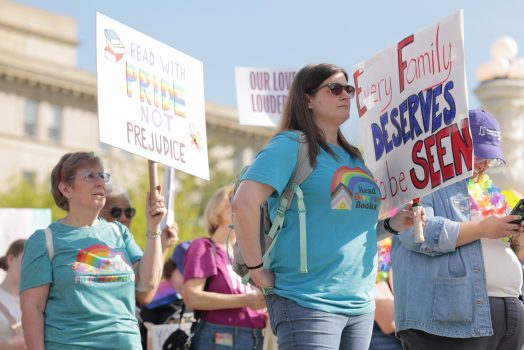
By Andy Beyer
In the pending case Mahmoud v. Taylor, the U.S. Supreme Court faces the question of whether the Free Exercise Clause of the Constitution requires that parents be permitted to exempt their children from public school classroom lessons that conflict with their religious beliefs.
The case itself deals with books with LGBTQ+ characters and themes of LGBTQ+ acceptance, but the attorney from the Christian Nationalist legal group representing the handful of plaintiff parents made clear that the kinds of exemptions from inclusive and science-based educational materials that they are seeking know no boundaries. A ruling in favor of the plaintiffs would invite demands for religious opt-outs from lessons on evolution, history, or any other topic that runs afoul of a parent’s system of faith.
Despite the wide sweep of this claim, it seems likely, after the April 22 arguments in Mahmoud (which AU Litigation Counsel Jenny Samuels described last month), that the court may allow parents to punch holes into their children’s education based on their religious beliefs. But in reality, what neither the parents, nor the schools, nor the Supreme Court can do is prevent their children from encountering topics that contradict religious teachings throughout their lives.
Growing numbers of young Americans identify as transgender and nonbinary, with 3.3% of high schoolers currently identifying as transgender. These trans students will share classes with students whose parents request opt-outs from reading books featuring trans characters. Students may have trans and gender-nonconforming teachers, counselors, and coaches. They also may discuss these topics and other challenged content with one another.
That is not to mention the pervasiveness of technology and the ease with which information may be accessed online. Parents may succeed in shutting out the ideas they disagree with for some time, but the notion that they can long keep their children untouched by the curriculum taught to their peers strains credulity.
It also does the children a disservice and allows parents’ beliefs to trump children’s right to learn and access information. A public school curriculum, even one that imparts secular teachings that certain religions reject, prepares students for a life after school. That is not to say that people must accept everything taught in the classroom as the truth.
It is to say that cutting out lessons has consequences, both for students’ readiness to leave the classroom for a complicated, diverse world and for their development of the foundational skills of confronting unfamiliar, potentially disorienting beliefs. Many may decide to leave behind the faiths in which they were raised as they mature. An uncensored education ensures that they are empowered to make such a choice and can successfully make their way in the world thereafter.
During the oral arguments, the justices and attorneys frequently referenced Wisconsin v. Yoder, a 1972 case in which the Supreme Court allowed the Amish to withhold their children aged fourteen and older from public schools. Since Yoder was a lurch out of step with the bulk of the court’s Free Exercise jurisprudence, it is rather surprising that it enjoyed such a spotlight in this case. The legal arguments aside, however, the facts of Yoder lurk behind what the parents are asking for in this case – and hint at why it won’t succeed.
The Amish sought to withdraw their children from the reach of worldly influences, which they argued undermined their way of life. In that case, there was a logic to the conclusion that finishing the children’s education in an insular community would prove a successful quarantine against whatever disfavored beliefs they might be exposed to in public secondary school. The legal rationale for an exemption was tenuous, but there was at least reason to accept that the remedy the court provided might be effective until the children reached adulthood.
In this case, having children pulled out of lessons is unlikely to be an effective inoculation against their parents’ disfavored ideas. Public schooling is public. When student groups put up LGBTQ+ messaging in the hallways, teachers display photos of same-sex spouses, and the same books read aloud during the disputed lessons are available on the shelves at other times – all of which the parents’ attorney conceded were not being challenged – there is no fixed divide between the child’s religious and secular worlds.
Instead, these two worlds coexist, fostering a pluralistic society in which students learn to be respectful of difference and navigate disagreements – even serious ones – with civility. These interactions serve as preparation for life beyond school, where the same issues will resurface again and again.
The right of parents to control their children’s religious upbringing, like all constitutional rights, has principled limitations. It also has practical ones. The first category should bar claims for opt-outs from secular lessons that contradict religion; the second demonstrates why that is also the right answer as a matter of policy. Public schools should not be required to administer an infeasible system of opt-outs for the sake of an infeasible goal.
Andy Beyer is a Youth Organizing Fellow with Americans United for Separation of Church and State.
Photo: People who oppose religious opt-outs from LGBTQ+ books in public schools rally outside the U.S. Supreme Court on April 22, 2025, in Washington, D.D., during oral arguments in the case of Mahmoud v. Taylor. Photo credit: Anna Moneymaker/Getty Images.